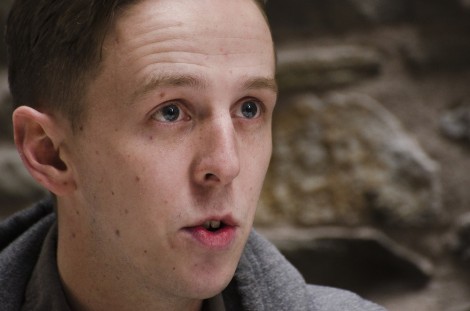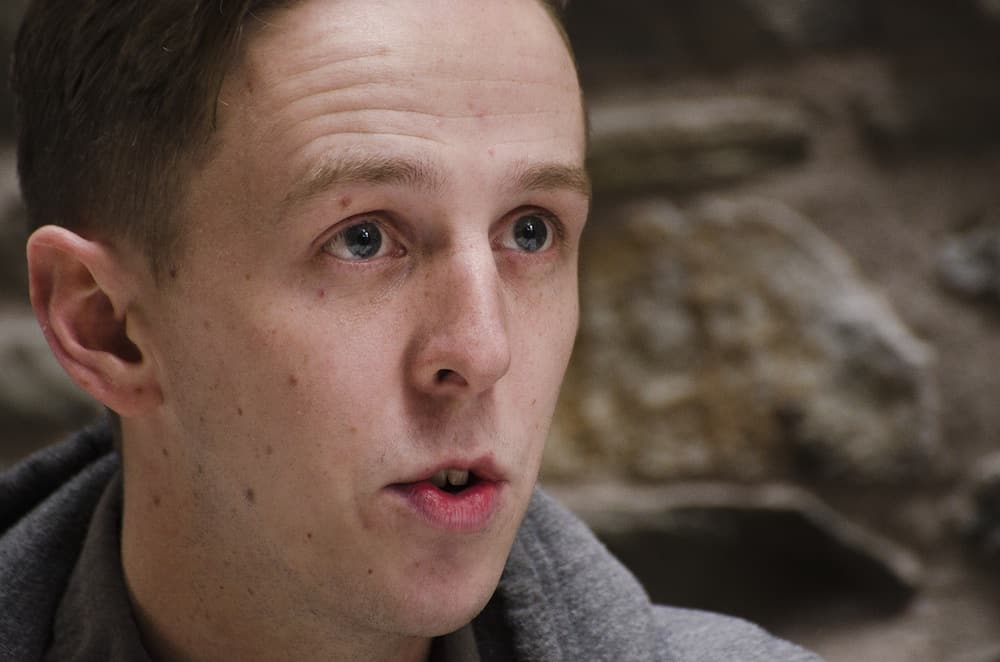On January 19, Alastair Woods was re-elected for a second term as chairperson of the Canadian Federation of Students-Ontario (CFS-O). During his first term, a number of student unions, including the University of Toronto Graduate Students’ Union (GSU), filed petitions to hold referenda on the question of separating from the federation. Critics cite undemocratic practice and fiscal irresponsibility as reasons to sever financial ties with the federation.

Alaister Woods has been re-elected for a second term as chairperson of the CFS-O. DENIS OSIPOV/THE VARSITY
Despite the controversy, Woods was very active during his first term, representing students through professional lobbying and advocacy projects. The Varsity sat down with Woods to discuss the past, present, and future of the organization.
Lobbying and advocacy
Asked about highlights of his tenure so far, Woods says he enjoyed re-engineering CFS-O’s advocacy operations. “We want to make [CFS-O advocacy] more specific to local contexts, and give different student unions more space to organize on their campuses around issues that they know are going to affect their members, in ways that are actually relevant to their members.”
The CFS-O continues to focus its lobbying and advocacy work on lowering tuition costs in Ontario. “We just submitted our recommendations to this year’s provincial budget. Those recommendations include a 30 per cent tuition fee reduction in three years, the first year being cost-neutral because we are trying to utilize the money that has been set aside for the Ontario tuition grant and education tax credits,” says Woods.
The CFS-O’s budgetary recommendations come on the heels of changes to Ontario’s flat-fee system. Woods points to CFS-O lobbying as a driving force behind this policy development. “The minister himself congratulated students at the UTSU and also the CFS-O for giving him a convincing argument that there needed to be change, and I think that that says everything about the victory.”
Unpaid internships are another policy issue on the CFS-O agenda this year. “Our recommendations on [unpaid internships] are actually two-fold: To get the government to start collecting statistics around it — something they don’t do yet and they should — and asking the government to [eliminate] unpaid work-terms and co-ops in the public sector.”
Controversies
Notwithstanding these successes, the CFS has spent years embroiled in controversy, largely stemming from allegations of managerial misconduct and meddling in the politics of member student unions. Recently, student society members — such as the Post-Graduate Students’ Society of McGill — have accused the federation of deliberately delaying the verification of decertification referenda and of active petition-suppression. Woods denies these accusations: “The charge that there is foot-dragging or that there doesn’t want to be recognition of a petition is false. It is not a fair or accurate description,” he says.
Woods suggests that administrative issues and privacy concerns have caused delays in the verification of the University of Toronto Graduate Students’ Union’s decertification petitions. “In September, a petition was delivered to our office from somebody who alleged to be a member of U of T’s Graduate Students Union that also appeared to contain signatures to have a decertification referendum. When I followed up, the next four months became a lengthy back-and-forth about why we couldn’t be given a membership list because of privacy concerns. We met [with the GSU] in November to discuss our option, which was a one-way searchable list that is not a full list of people. We would simply type in a name and a student number and it would say, ‘Yep! This person is a member of the GSU’, or ‘Nope! Don’t know who this person is.’ That again was not possible.” He added that, after meeting with University of Toronto administration and the GSU, “in the spirit of compromise, [the CFS-O] agreed to go back to our executive committee with [the suggestion made by university administration] that a third-party auditor undertake the verification process for us.” The CFS-O is currently in the process of retaining an auditing firm for this purpose. U of T administration has offered to reimburse the federation for this expense.
Personal controversy also follows Woods into his position as CFS-O chairperson. When Sana Ali resigned from the Renew slate during last year’s University of Toronto Students’ Union (UTSU) elections, she pointed to Woods as one of the managers of the election campaign that, she alleged, “[squashed] dissent and individuality within the team.”
Woods does not shy away from accepting personal involvement in the election, though he denies that it constituted a conflict of interest. “CFS and CFS-O are not involved in any way in the election of any students’ unions. [UTSU president Munib Sajjad] is a long-time friend of mine. We have been doing student organizing together for quite some time, and he approached me before I even considered running for the position of chairperson, saying, ‘I am thinking about running for president, I wonder if you have any time to volunteer and to help me out.’ As a friend, I said yes, and I don’t see that there is any issue with that.”
Woods says he would not work in a similar capacity today. “That’s not something I would engage in as chairperson because I represent the province, and that’s a local issue. The CFS does not engage in any kind of elections organizing on a local level because local students unions are autonomous.”
Looking ahead
Woods believes that the immediate future of the CFS lies with its members. “It is our members who make the decisions and are ultimately the ones who make the legacy of the next year.” He also sees potential for further policy success: “I hope that we can make some significant influences and inroads in the upcoming provincial election.”
Woods is less enthusiastic about the possibility of dissatisfied student societies decertifying. However, he ruled out legal action against student unions that hold decertification referenda: “I think it is important to know that the federation does not initiate legal action with member locals. The referendum — should it go forward, and should it have an outcome one way or another — is the decision of members at that local.”


